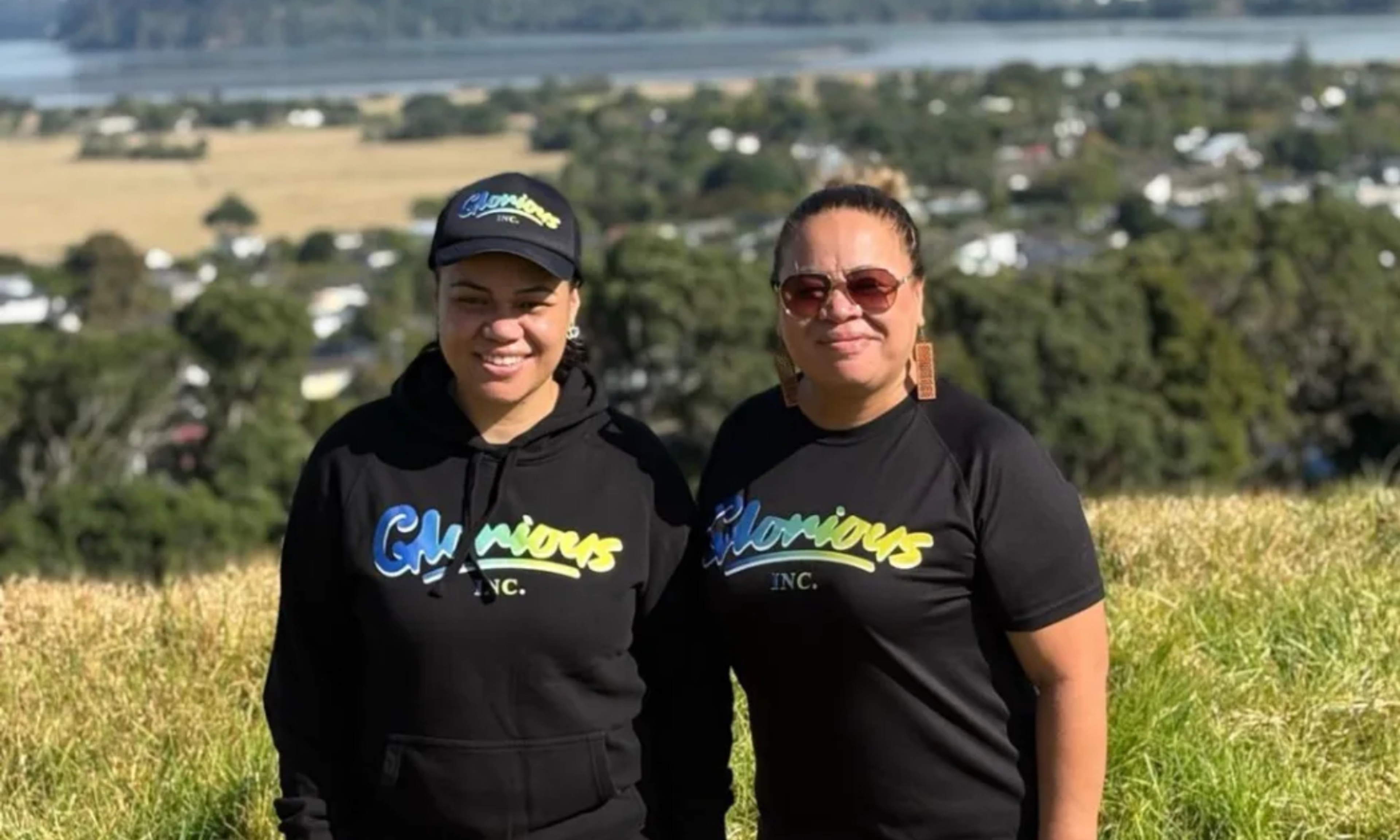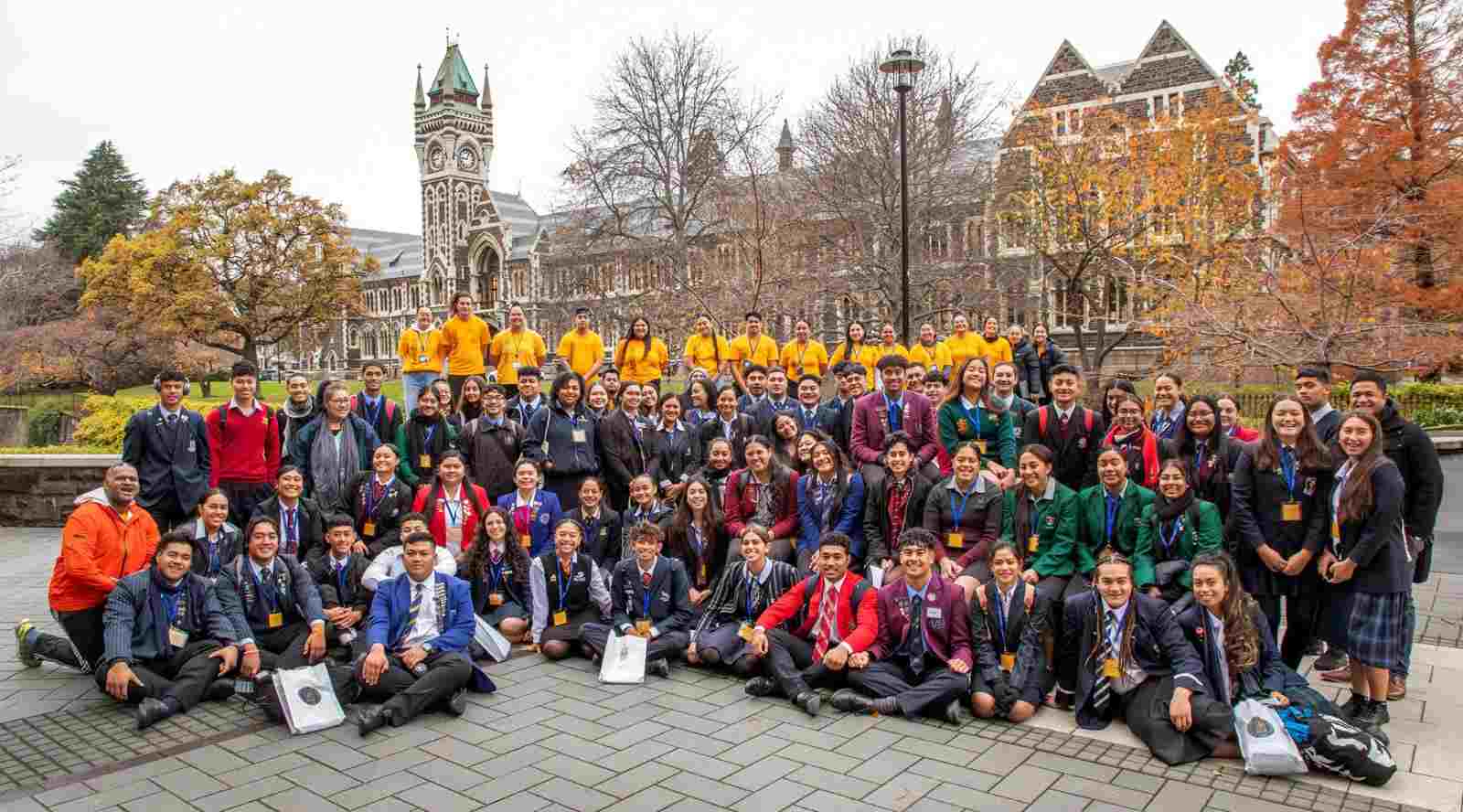

Eric Nabalagi taking a selfie with Pacific students.
Photo/Pacific Island Centre, University of Otago Facebook Page
Why Otago is becoming the university of choice for an increasing number of Pacific students
Despite freezing temperatures, being far from home and feeling like the minority more and more Pacific students are choosing the University of Otago.



Record candidates in Auckland elections highlighting youth empowerment

From obedience to opportunity: Manu Sina captain champions Sāmoa women’s rugby

Cook Islanders worry over China amid anniversary party


Sisters transform Kiwi tourism with authentic Māori and Pacific cultural experiences

Record candidates in Auckland elections highlighting youth empowerment

From obedience to opportunity: Manu Sina captain champions Sāmoa women’s rugby

Cook Islanders worry over China amid anniversary party
Six blankets, thick kiwi accents, noodles, puffer jackets and studying summed up my four years in Dunedin. I wore gloves inside my flat during the winter – and braved sub-zero temperatures when walking to class.
I went from a Warriors fan to a Highlanders fanatic trading a love of Auckland Rugby League for the South Island Rugby Union religion.
To many, the University of Otago is known as New Zealand’s oldest and most prestigious university, in a city riddled with heritage buildings and churches inspired by the early Scottish settlers.
It was established in 1869 and 150 years later parts of the campus still looks like they were transported from an 1800s Scottish time capsule.
But for me, walking around campus and sitting in my classes, often as the only brown person – I would often ask myself: “Why did I come here?”
But being the odd-one-out is decreasingly not an issue for many Pacific students as Dr Edmond Fehoko says, who just became the University of Otago’s first Pacific lecturer in the Department of Public Health.
“I honestly believe the South Island, and particularly Dunedin is set to become a hub for Pacific communities.”
And Fehoko is not alone in making such a bold claim.
While Otago has been the home for many Pacific scholars over its long history, over the past five years, the university’s Pacific population has slowly risen.
Pacific enrollments have jumped from around 800 in 2017 to now being over 1300 and Pacific make up around 6 per cent of the student population.
To figure out why our people are increasingly choosing to study in Dunedin - I asked four of Otago’s Pacific alumni: “Why choose Otago?”
A deeper connection
Eric Nabalagi moved from the highlands of Viti Levu, Fiji over 20 years ago to Dunedin, graduating with a Bachelor of Commerce and Accounting.
Eric holds a perspective of both a student, and a staff member, as he’s been working at the Pacific Island Centre for the last 15 years.
He says moving so far from home made him stronger, but surprisingly it was also the commonalities between Dunedin and the Pacific that made it easier for him to settle.
“The English and Scottish people, we have something in common that some don’t realise. One is Christianity and secondly, most importantly is education. Those are the most important things for us as Pacific Islanders.
“There’s churches everywhere [and] there’s a big massive university right in the middle - you get here, and you realise wow, these are the values the Scottish had that we have in common.
“No wonder our people come from all over the Pacific Islands to the coldest part of New Zealand!”
Nabalagi also alludes to the smallness of Dunedin's Pacific community, and how everyone knows each other as another important factor.
"We've got external engagement, school liaisons, we go to schools and offer scholarships. When we go out to the community, the parents see us, we make connections, and they trust us.
"As a parent they're hesitant about sending their kids far from home. But when you make those connections, you create that trust."

The University of Otago's clock tower. Photo/PMN News/ Matt Manukuo
Adjusting to cultural change
For Pacific students, living in Dunedin is a world away from what they know. Ariel Ioane grew up in Alafua, Apia in Samoa and is in her sixth year as a pediatric student at the university’s medical school.
The seeds were planted at a young age for her, with uncles and aunties graduating in medicine and law at Otago.
She says seeing the graduation ceremonies her family attended gave her an idealised perspective of what Dunedin would be like, but she was given a quick reality check when she attended herself.
“It definitely looked glittery and gold as a kid when you see all the pictures and the photos from graduations," she says.
“What I didn’t realise, was the difference in the ethnic distribution because I grew up in Sāmoa around Sāmoans, so I never really felt out of place. And then I came to a place where there weren't as many brown people.”
Ariel says one of the biggest challenges was trying to figure out who she was outside of her familiar cultural context but she soon turned this into a positive.
"It really helped shape my view of the world," she says.
"A lot of the things you think about are shaped by the people that raise you. And it was nice to step out, to be in a place where you weren't under the social pressure of 'you are your parents child', [and] having the opportunity to reflect and be like 'who actually am I outside of my cultural identity'."
A sense of independence
Choosing to move away for studies, fresh out of high school can be scary. For me, I wanted to learn how to stand on my own two feet, something my dad always told me and my brothers. For first year law student Aviu Aviu, the reasons were much the same.
Aviu is originally from the islands of Nikinau, Nonouti, Arorae and Abaiang in Kiribati, and moved down south from Manurewa, Auckland.
He says the difference in ethnic diversity to South Auckland was startling at first but it also led him to build deeper relationships with those he did connect with.
“For the first few weeks I was finding it hard to spot another brown face. So I had to find that familiarity where you meet one brown person, they introduce you to five, then ten more.
“It was a taste of home.”
Aviu was determined to “find his way” living away from home, which meant learning to pay his rent, cook himself food and getting to class on time.
“It’s a drastic difference to put everything on yourself. Having that accountability, with no one really looking over your shoulder.”
Avius' mindset wasn’t to head to Dunedin just for studies, but to also see Dunedin as a second home. He says the sense of community and the student support groups bought him comfort in what was initially a foreign environment.
“It will never be home, but a massive credit to the friends I met along the way, and the many support groups that made it the home I wanted it to be" he says.

Pacific on Campus Experience 2021. Photo/Pacific Island Centre, University of Otago Facebook
Student support
Otago’s Pacific Islands Centre was established in 2001 and has been delivering academic and pastoral support for thousands of Pacific students.
I was introduced to the center through its Pacific on Campus Experience in 2018, where they invite students around New Zealand to experience life as a student.
We were encouraged by then-General Manager Tofilau Nina Kirifi-Alai, that Dunedin would be the best choice to study after leaving high school, as it encapsulates all the ingredients you need to succeed.
Today, the Pacific Island Centre is run by Tagiilima Feleti, who was born in Samoa and raised in Dunedin. He says they can confidently say Otago has something that may appeal to most Pacific peoples.
“The university has quite a prestigious perspective around Aotearoa and globally, so we see that flow of students coming from the far north and across the Pacific.”
Feleti says the Pacific Islands Centre’s mission is to encourage students to feel as supported, and comfortable in Dunedin as possible.
“We have plenty of students from various Pacific backgrounds come into the center, whether it be for supplementary tutorials provided here, academic support or pastoral care.
“Some just like coming here to hang out, going into the kitchen to find some kai, but also just having a place to come here and be Pacific.
“This becomes a home away from home, a place where they feel safe, a place where they can get the support they need.”
Why Otago?
Moving back to Auckland after my four-year stint, I soon realised the genuine love I felt towards Dunedin, and the people who made it so special.
And through writing this story, I've also reflected on something my Dunedin mentor Eric Nabalgi said: "You are away from home, around students who are going through the same thing. We're all poor, we're all cold, but those are the experiences that mold us, to prepare us for life."
As I learnt through the connections, the vulnerable times and the struggles and triumphs, Otago is somewhere our people should definitely consider going.